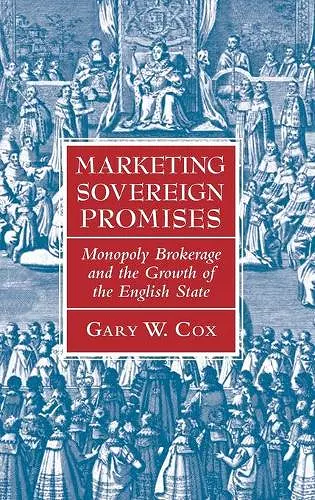Marketing Sovereign Promises
Monopoly Brokerage and the Growth of the English State
Format:Hardback
Publisher:Cambridge University Press
Published:9th May '16
Currently unavailable, and unfortunately no date known when it will be back

This book offers a new theory of state growth, based on the creation of credible and prudent state budgets.
Democracies extract more tax revenue per capita than autocracies. This book addresses the origins of taxation, examining how it can be made compatible with political liberty and economic growth. This study speaks to readers of political economy of development and comparative institutions, and historians of state formation in Europe.How did England, once a minor regional power, become a global hegemon between 1689 and 1815? Why, over the same period, did she become the world's first industrial nation? Gary W. Cox addresses these questions in Marketing Sovereign Promises. The book examines two central issues: the origins of the great taxing power of the modern state and how that power is made compatible with economic growth. Part I considers England's rise after the revolution of 1689, highlighting the establishment of annual budgets with shutdown reversions. This core reform effected a great increase in per capita tax extraction. Part II investigates the regional and global spread of British budgeting ideas. Cox argues that states grew only if they addressed a central credibility problem afflicting the Ancien Régime - that rulers were legally entitled to spend public revenue however they deemed fit.
'Seventeenth-century British public finance stands at the intersection of several fields of scholarship - economics, political science, and history - and research on it lies at the foundation of contemporary political economy. In this important work, Gary W. Cox revisits the topic and offers an interpretation of his own. The book is pure Cox: deeply researched, closely argued, and profound - political economy done right.' Robert H. Bates, Harvard University, Massachusetts
'This is a major contribution to institutional economics, the application of those methods to understanding British political development, the comparative history of fiscal constitutions, and an interesting extension of arguments about the Industrial Revolution.' Michael Braddick, Sheffield University
'Cox combines attention to history with carefully laid out models of political economy to understand just how England arrived at limited government. This is the most important book in historical political economy in the last decade.' Jean-Laurent Rosenthal, California Institute of Technology
'Cox provides us with an important new analysis of a critical historical episode, the growth of parliamentary responsibility in Britain, its economic consequences, and the diffusion of this practice to other countries. He adds greatly to our understanding of how the modern state came to be.' David Stasavage, New York University
'Summing Up: Recommended. Upper-division undergraduates through faculty.' B. B. Andrew, Choice
ISBN: 9781107140622
Dimensions: 235mm x 157mm x 18mm
Weight: 460g
238 pages